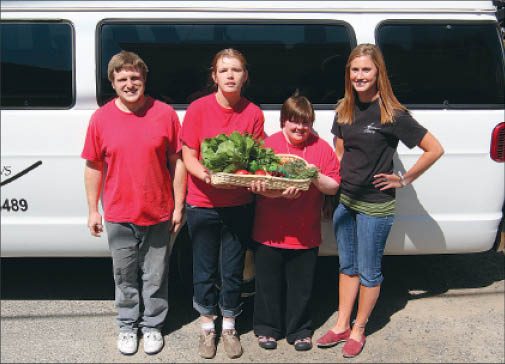
Home » Finding work for more people
Finding work for more people
The Artisans offers group or individual employment opportunities to its clients

August 25, 2011
Despite an escalation in job competiveness across the U.S. and here, a Spokane-based nonprofit called The Artisans says it's seeing success in placing the developmentally- and physically-disabled people it assists in local employment positions.
More than 100 disabled individuals in the Spokane-area currently are working between five and 40 hours a week through The Artisans' employment-services programs, says Polly Maxwell, the nonprofit's director.
Maxwell says the number of people the organization serves has increased continually in the last several years, and many employers in the area still look to hire its clients even though the economy remains sluggish.
The 24-year-old organization, located at 200 E. Second, focuses on offering its clients on-site job supervision and continual job training so that the client's employer or an outside job trainer doesn't have to invest extra time and resources into additional training for someone who might need it, Maxwell says.
"With the labor market here, we stand out because we offer training and ongoing support," she says. "We are able to assist the client so the employer doesn't have to use their resources to do that."
Mary Hilt, The Artisans' assistant director, says she's noticed in the last several years that businesses in the Spokane area seem to be using the organization's clients and services even more in an effort to cut operating costs.
Hilt and Maxwell say that in addition to training and providing job coaches, the organization also pays its clients' Washington state Department of Labor & Industries' fees, which they assert can be expensive for some businesses.
In all, the nonprofit has 16 employees, including its directors, and is governed by a 12-member board of directors, Maxwell says. The Artisans employs 14 people who work as job coaches or job developers.
The nonprofit is funded by the Washington state Department of Health's division of developmental disabilities; Spokane County's Community Services, Housing, and Community Development Department; private donations; and some fundraising, she says.
To be eligible to receive free job-placement services, clients must have been diagnosed as being developmentally disabled as youth, Maxwell says. She says the organization also helps physically-disabled clients in finding jobs.
As part of the services it offers in the areas of job placement, development and coaching, The Artisans focuses on two basic employment programs based on a client's needs and goals: group employment and individual employment.
In its group-supported employment program, groups comprised of between four and six clients are placed around the community, Maxwell says. Those clients work in a variety of positions, such as landscaping, janitorial, and various production jobs, and an Artisans job coachmonitors and assists the group members.
In some cases, Maxwell says she's seen local businesses reduce the number of employees and then end up hiring an Artisans work crew.
Maxwell notes that while most clients who come to the Artisans seeking job placement find employment, it has taken more time and effort in recent years to find positions for them.
She says about 90 percent of group-supported clients find work, while the placement rate for individually-supported clients is slightly lower.
Hourly wages for the clients who work in a group setting are based on productivity, she says. Revenue brought in through the services those work crews provide is then used to pay their salaries.
Maxwell says some of The Artisans' work groups provide janitorial work for various facilities, including the Saranac Building, Main Market Co-op, and Houk Chiropractic Clinic, as well as for private homeowners who also hire the work crews.
About eight Artisans' clients are now working at two community gardens here where the organization either owns or rents plots, the directors say. In all, Artisans' clients tend to and cultivate about 15,000 square feet of garden space, she adds.
The groups that tend the gardens also help sell the produce at farmers markets, they say.
In addition to working in groups, The Artisans' clients also have the option to work individually in a position with an outside employer, Maxwell says. Clients wishing to work on their own are trained by Artisans job coaches in the areas of interview skills, personal hygiene, social skills, and workplace appropriateness, in addition to training on specific tasks, to ensure they have the necessary skills to succeed in their jobs, she adds.
Before an Artisans client interviews for an outside position, Maxwell says the staff helps determine what types of jobs might be of interest and identify necessary skills.
As an example, Maxwell says that many Artisans clients who work in the fast-food industry receive assistance from job coaches in obtaining a food-handler permit and other needed documentation.
"That is difficult for many of our clients because they don't read or write, and we help them through that testing process," Maxwell says.
Once a client is hired by an outside company, Maxwell and Hilt say the job coaches monitor their progress and provide ongoing training to that client.
Businesses that employ individual Artisans clients include Spokane locations of Walmart, Little Caesars Pizza, Taco Time, and Davis Office Furniture, Hilt says.
In many cases, those clients who are independently working in the community are able to stop receiving or greatly reduce the amount of state-funded disability assistance they receive, Maxwell says.
"Many clients have never had a job or have never been told they need a job," she says. "We have seen self-esteem skyrocket when they get their paychecks and are able to spend their own money they have earned."
Latest News
Related Articles




